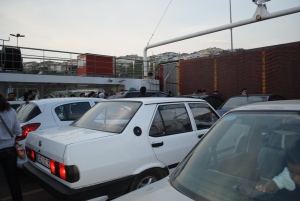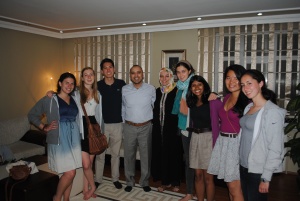by Sanjena Sathian
Last night, as part of our final evening in Istanbul for a while, a group of us went to a local family’s home for dinner. After a two and a half hour trek out to the suburbs in intense traffic – with a stop in the middle of the traffic to quench our growling stomachs with some street food AND a ferry ride, where we parked our enormous bus on the lower deck and wandered up to the top – we finally arrived in a suburb crowded with tall apartment complexes and the occasional mall. I felt a sudden wave of comfort as soon as we stepped into the apartment building and I saw piles of shoes outside each doorway – a practice common in my Indian family’s household, and a sight I’m used to seeing in my grandparents’ apartment complexes when I go to visit.

The family greeted us warmly; we left our shoes outside, entered, and shook the hands of a line of men and a single woman, completely covered in black except for her playful, colored headscarf. We were ushered upstairs to an enormous, decorated table with piles of delicious looking food on top of it: rice, stuffed peppers and grape leaves, chickpeas and green beans with gravies, lentil soup… I was ready to dive in. I sat down across from Daria, the mother-queen of it all, who was the only woman at the table from the family for most of the meal – and also the only person in the entire family who spoke English. She was over the moon, she told us, when we piled into their apartment and she saw five girls and only one boy. “I have too many boys,” she laughed, smiling at her nine and five year old, and then at her husband.
As I chatted with Daria in her careful English, my assumptions about headscarves came back to slap me across the face for the umpteenth time this trip: so many of our assumptions about social conservatism simply don’t translate here. I shouldn’t have been surprised to see Daria command the table, rather than her non-English speaking husband, sons, nephews, and cousins, and I definitely shouldn’t have been surprised when she told us, in response to our copious compliments on what we assumed was her cooking, “Thank you, but I do not cook, because I am so busy at work.” Daria is a chemical engineer, working in the same company as her husband.
The apartment felt warm and lived-in, and as a bunch of college students who spend too much time away from home in favor of going on trips like this, nothing could have felt better. But for me, especially, so much of Turkey has started to feel closer and closer to comfortable. It’s strange to say you feel “at home” in a country you’ve barely known for a week, but as we’ve explored Istanbul from early wanderings through the Blue Mosque at seven AM to later night expeditions, we’ve all become enchanted by this city – and we keep saying to each other, “I don’t feel like this very often about a city…” like we’re reassuring each other that we’re not fickle about entering into love affairs with cities.
We asked Daria and her husband about their favorite parts of the city and found we agreed on Üsküdar, the area in the Asian side of the city near the water; we quizzed one another on our favorite Turkish foods and asked all about each other’s families. Daria and I traced all the words I’ve found that are the same in Turkish as in Hindi, the language I’ve been studying at Yale, and Turkish (Charlotte and I found they’re the same in Farsi, and Ali and I tracked them to Arabic as well): dunya for “world,” sehir for “city,” badam for “almond,” sebzi for “vegetable,” kitap for “book” – and probably many more I haven’t figured out yet. As I mimicked her pronunciation, she made my night when she said, “You must learn Turkish! You’re saying it all well.”

Istanbul wrapped us up in its deliciously enchanting arms already, but it’s Daria and her family who cemented it for me personally. This is, as we’ve been observing again and again in many forms, a land where the new and old are colliding, where the vocabulary of the West is challenged by a society heavy with the East. But each challenge has made me feel strangely “at home” in this country in a way that is hard to come by when you travel to a brand new place.
Like Uzra pointed out, it would be silly to pretend I’ve come to Turkey and “gotten it” in a week. But one of the great pleasures of traveling as a journalist is that we keep asking questions and pushing a place to tell us more and more about it. And if anything, we’ll always be left unsatisfied, wanting more. So I don’t know about the other Globalistas, but I’m coming back – in a year, or two, or more, but I’m coming with a whetted appetite. Get ready, Istanbul.